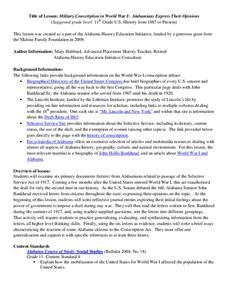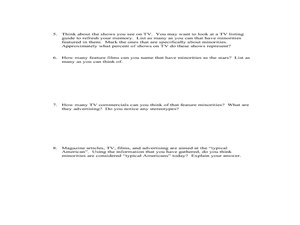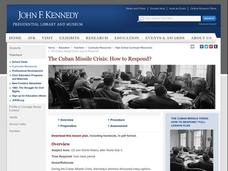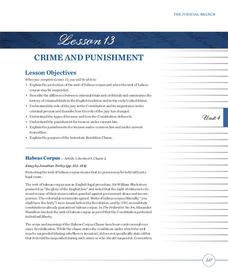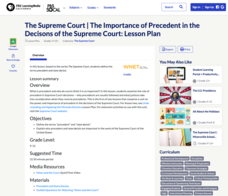Alabama Department of Archives and History
Military Conscription in World War I: Alabamians Express Their Opinions
If called, would you go? Should the US government have the power to impose a draft during any war? The Selective Service Act of 1917 (aka the Conscription Act of 1917) authorized the drafting of men into the military for only the second...
Alabama Department of Archives and History
Alabama's 1901 Constitution: What Was at Stake?
Who should be able to vote? As part of a study of the 1901 Alabama Constitution, class members examine primary source document that reveal the reasons the authors gave to support their positions on this question and their assumptions in...
Curated OER
Minorities in Mainstream American Society
So many people fought for Civil Rights in the United States. Read about the Civil Rights Act of 1964, and discuss what the act guarantees. Then pass out a slew of magazines and encourage them to observe how often minorities appear in...
John F. Kennedy Presidential Library & Museum
The Cuban Missile Crisis: How to Respond?
For 13 days, the United States stood on the edge of nuclear War. The Soviet Arms buildup in Cuba is the focus of an activity that asks groups to analyze how the governmental role each of John F. Kennedy's advisors played went on to...
State Bar of Texas
Mendez v. Westminster and Delgado v. Bastrop ISD
You arrive at school only to be told you have no place there. Scholars research the Supreme Court cases Mendez v. Westminster and Delgado v. Bastrop ISD, both dealing with school segregation. Two short video clips as well as small group...
American Battle Monuments Commission
Honoring Service, Achievements, and Sacrifice: A WWI Virtual Field Trip
The largest offensive in United States military history comes alive in a online interactive resource. Young historians explore the Meuse Argonne battlefield and scour the landscape for evidence from the battle. They then use primary...
Heritage Foundation
Crime and Punishment
You wouldn't give someone a 10-day timeout for eating a piece of candy. The US government, too, does not believe in unreasonable punishment. A variety of exercises exploring the clauses of the US Constitution prompts class members to...
Classroom Law Project
What does the Constitution say about voting? Constitutional Amendments and the Electoral College
As part of a study of voting rights in the US, class members examine Constitutional amendments connected with voting and the role of the Electoral College in the election process.
Smithsonian Institution
Changing Gender Roles on the Home Front
Many historians discuss how gender roles changed because of World War II, but how did this come to be? An informative resource challenges scholars to do some digging and research the information for themselves. They research how...
PBS
Master of the Airwaves: How FDR Used Radio to Ease the Public’s Fears
The political and economic climate during the 1930's was uncertain and tumultuous. But Americans' minds and hearts were eased with the reassuring words of their president, Franklin D. Roosevelt, and addresses over the radio. High...
Smithsonian Institution
Borders and Community: Early 20th Century Chicago Neighborhoods and Ethnic Enclaves
Chicago is one city, four neighborhoods, and countless nationalities. The lesson explores the ethnic division of Chicago in the early twentieth century. Academics read primary sources, analyze maps, and tour an online exhibit to...
Stanford University
Lesson Plan: Montgomery Bus Boycott
Most of us have heard of Rosa Parks, the Montgomery Bus Boycott, and Martin Luther King, Jr. But what about Claudette Colvin, Virginia Durr, Freedom Summer, or the Birmingham Children's Crusade? A five-lesson unit prompts class members...
Smithsonian Institution
Re-Segregation of American Schools: Re-Segregation
Examine the re-segregation of public schools in a thought-provoking resource. Young scholars read articles and primary sources, complete worksheets, and watch a video to explore the idea that desegregation made schools more segregated....
Smithsonian Institution
Fighting For Freedom: The Stono Rebellion and Free Frank McWhorter
Travel back in time to the Stono Rebellion. Young historians research historical figures who played a role in African Americans' fight to escape slavery. Scholars research material, complete handouts, participate in group discussion, and...
PBS
The Supreme Court: The Importance of Precedent in the Decisions of the Supreme Court
People often hear the words precedent and Supreme Court together, but why? A resource on the Supreme Court includes a variety of discussion questions, handouts that guide young historians, a video about Nixon and the court system, and...
Smithsonian Institution
Separate is Not Equal: Fight for Desegregation
Separate is not equal! An eye-opening lesson delves into the past to understand the fight for desegregation and how it impacted African American communities. Academics complete two one-hour lessons using documents, photographs, and...
Smithsonian Institution
Resistance to School Desegregation: The Boston Busing Crisis
Despite how it sounds, Boston's busing crisis wasn't a transportation problem. Academics address the problems faced by African Americans following school desegregation and the struggle to receive equal educational opportunities. Scholars...
Smithsonian Institution
Strength in Solidarity: Coalition of Immokalee Workers and the Campaign for Fair Food
Not all food is created equal. The lesson plan dives into the world of migrant farm workers to show their struggles to earn livable wages and better working conditions. Academics learn why the Coalition of Immokalee Workers was created...
National Woman's History Museum
Inventive Women - Part 1
While a woman didn't invent the parasol, three women received patents for their improvements to the original design of umbrellas. In the first of a two-part series on inventive women, class members investigate the patent system to...
University of Arkansas
Assessment and Discussion
"Without concerned citizen action to uphold them (human rights) close to home; we shall look in vain for progress in the larger world. . ." Eleanor Roosevelt's comment is used to set the stage for the conclusion of a five-lesson unit...
Middle Tennessee State University
John Brown: Hero or Villain?
"Love it or leave it." "You're either for us or against us." Rhetoric and it's polarizing effects are the focus of a instructional activity that uses John Brown's attack on Harper's Ferry as an exemplar. Groups examine primary source...
PBS
President Theodore Roosevelt: Foreign Policy Statesman or Bully?
Can a negative perception of a president's foreign policy harm his or her historical legacy? A project that winds the clock back to the date of Theodore Roosevelt's death puts students at the editorial desk of a fictional newspaper....
City University of New York
Presidential Elections and the Electoral College
To understand the controversy surrounding the US 2000 presidential election, class members investigate the rationale behind the Electoral Collage, the intimidation involved in the election of 1876, and the 2004 American League...
City University of New York
Urban Politics: Machines and Reformers
What were political machines and whom did they serve? As part of a study of US immigration patterns and how these patterns influenced politics, groups investigate how Tammany Hall and other political machines gained support from voters.


